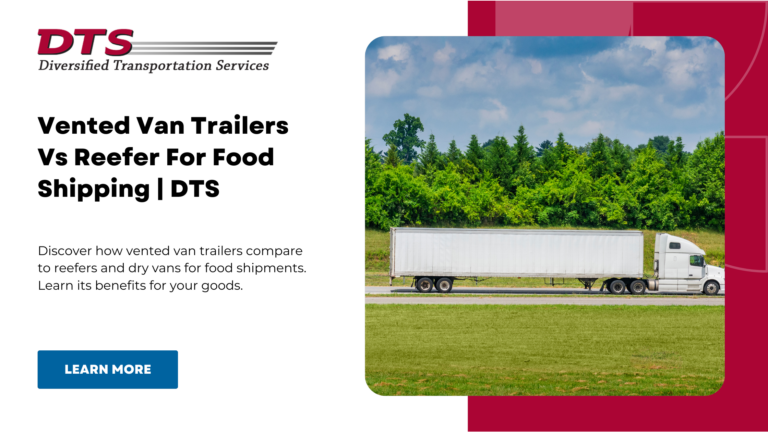
When transporting food, especially across long distances, choosing the right shipping method is vital. Certain foods are particularly sensitive to high temperatures and moisture, so protecting them from both is important.
Vented van trailer shipping is a popular method for transporting food safely, and it offers some important benefits. In this post, we’ll explore how vented van shipping works and how it compares to other food shipping solutions.
A vented van trailer is a common type of dry van trailer equipped with small vents or perforated panels. These vents allow air to circulate throughout the trailer and are usually placed at the front and back for maximum airflow during transit.
Vented van trailers are a good choice for certain food shipments (especially agricultural products) because the vents help prevent the buildup of moisture, heat, and odors.
Some of the food and agricultural products often transported in vented van trailers include:
In bad weather, truck drivers can open and close the vents to protect goods from the elements. For example, if a torrential downpour starts and a driver has a chance to pull over, they can close the vents to prevent water from getting inside the trailer.
Choosing the right shipping method is crucial when planning food shipments, whether you’re sending perishable meat and poultry or canned goods. Selecting the right type of transportation will help your food shipments reach their destination intact and in saleable condition.
Choosing the wrong approach can lead to rejected shipments and avoidable expenses. It could also harm your business relationships with retailers.
What is a vented van best for? How do dry vans and reefers measure up? Here’s a comparison of the different food shipping methods available:
Vented van shipping is designed for improved airflow, which helps preserve goods that are sensitive to heat or humidity. They are ideal for non-perishable foods, such as fruits, vegetables, and packaged items that don’t need to be refrigerated.
Vented van trailers are best suited to regions with mild weather to prevent extreme heat or cold from affecting the cargo.
Dry van shipping offers no ventilation, so it’s better for goods that are unaffected by heat, humidity, or odor buildup. With that in mind, dry vans are ideal for completely shelf-stable food products, like dry snacks, canned goods, and beverages.
Dry van shipping costs less than vented van transportation, so it can be an affordable option if you’re mostly shipping shelf-stable food.
A vented van trailer provides a comfortable middle ground between dry vans and refrigerated trucks (reefers) as they offer airflow to keep products stable. Dry vans lack this key feature entirely, which makes them better for canned goods or food in airtight packets.
Vented van shipping provides airflow but has no temperature control. That makes vented vans suitable for foods that tolerate changing ambient temperatures, such as certain fresh produce and packaged snacks.
Vented vans are a more cost-effective option than reefers, which helps save money when transporting goods that don’t need cooling.
Reefer Trucking offers full temperature and humidity control. This is ideal for perishable or highly temperature-sensitive goods like dairy, meat, frozen foods, and produce. Opting for reefer shipping is essential for complying with certain food safety regulations.
However, reefer shipments have higher operational costs due to refrigeration equipment and energy use. Those costs are passed on to shippers with higher overall freight rates for reefer shipments.
Choose reefer vans when shipping temperature-sensitive food, and go for a vented van trailer for goods that need airflow but not cooling.
Vented van trailers, dry vans, and reefers all have their own benefits and drawbacks. Understanding the pros and cons of each method will help you make the best choice when shipping food and other perishable goods.
For more great tips about food shipping, check out our blog post about shipping perishable goods safely and efficiently.
Need help to choose between vented van trailers and reefer trucking or have more questions about shipping food? DTS can help. For a free quote on DTS’ food transportation solutions, get in touch for a free food transportation solutions quote.
Whether you're a company looking to improve one facet of your supply chain, your entire supply chain, or simply looking for a transportation and logistics consultation, we can help.